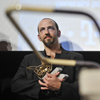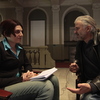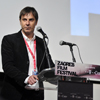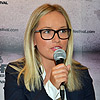23.10.2011
Exclusive interview with David Cronenberg
 This year the Zagreb Film Festival had a great honour of closing the festival with 'A Dangerous Method', the new film by the respectable director David Cronenberg. As a short introduction to this film, we offer you an exlusive interview with Cronenberg conceded to us by David Michael, a journalist for many international film magazines, daily newspapers and websites and one of the guests of the 9th ZFF.
'A Dangerous Method' has been screened at film festivals in Venice and Toronto and, besides attracting viewers with the name of its director, it can also lure them with its film crew made up of Keira Knightley, Viggo Mortensen, Michael Fassbender and Vincent Cassel. 'A Dangerous Method' is a film based on a true story about a tumultuous relationship between a fledgling psychiatrist, Carl Jung, his mentor Sigmund Freud and Sabina Spielrein, a beautiful young woman with psychological disturbances who gets between the two men. Some of Cronenberg's earlier accomplishments are: 'Videodrome', 'Naked Lunch', 'Crash', 'Rabid', 'Scanners', 'The Fly', 'M. Butterfly', 'A History of Violence', 'Eastern Promises'. Cronenberg's long-time associate, the award-winning and respectable director of photography Peter Suschitzky was a member of this year's Zagreb Film Festival jury.
Was there one of the two men, Freud or Jung, who’s theories interested you more before you did the film? Both of their theories are very fascinating, I just knew more about Freud than I did about Jung. It’s a little hard to know why? I think, I sense Jung’s philosophy wasn’t as interesting to me as Freud’s. Freud was the father of psychoanalysis and Jung came later. I must say though, once I decided the dramatic structure of Christopher Hampton’s play was so interesting, I got more interested in Jung.
The film almost seems to be Jung’s movie... It really is his story, but I don’t really think about it in those terms. Each character in the film is very potent. It’s hard to find movies nowadays where all the characters are at that level of intellect.
Can you understand people’s interest in therapy that evolved from this period of psychoanalysis? I think it is a very human thing to do, first something is liberating, then we become obsessed with it, and then we become addicted to it. There are people who are addicted to psychoanalysis and Freud never anticipated people spending 30 years like Woody Allen [laughs] in analysis! He would laugh at that. For him, it was, ‘Ok, you have a problem, we will have as many sessions as required’. He would be thinking maybe five or 10, but he never thought of years and years of analysis. That came later, that wasn’t part of the initial concept he was developing.
Have you ever had any form of therapy yourself? Me, no, I’ve never been in therapy. For me, it’s a specific tool, that you use if you need it. I must say, I never felt the need. I don’t have problems. I think of myself as an existentialist, the act of being an existentialist was very popular in the 1940’s and 1950’s, and now it’s very passé. I actually think to be it is a very difficult philosophy to hold, because it’s very accurate and very harsh what human life is. It’s not easy to deal with; that’s not a problem, it’s an understanding.
Has psychoanalysis informed your cinema? We know because of Freud’s emphasis of dreams at the beginning, it was attractive to artists of all kinds. You have Salvador Dali where the influence of Freud is admitted and obvious and even now, Bernardo Bertolucci says he uses psychoanalytical methods when he makes movies, I’m not sure how he does that, but I believe him, but for me growing up in the 20th Century the influence of Freud was huge, as this movie suggests. His thinking was considered very revolutionary and also by a lot of people very dangerous, very disruptive and very perverse. For example, he talked about child sexuality, incest, child abuse, at the time, nobody would admit a child had any kind of sexuality. That was considered a hideous thing to say. The influence in the thinking when I was growing was huge, so I’ve absorbed whatever understanding Freudian thinking has, but to me it’s not exactly an influence in the way you’d think. What I think is artists and psychoanalysts do parallel things; they do the same thing. You have an accepted version of reality, it’s the official version of reality, but you don’t accept it. You say, ‘Ok, that’s one level of functioning society, but what’s going on underneath the service? I’m feeling some things people aren’t talking about’. So I’m doing the same thing, but in a different context.
Have you ever found making any of your films therapeutic, so to speak? No, I don’t think of it as therapy at all. It can be cathartic when you get to play with and express things you never had the chance to. But the true idea of therapy, a corrector for something that is wrong, that is not film for me.
ZFFFOTO
|












